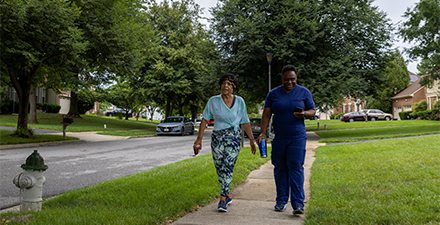As health care providers, physical therapists and physical therapist assistants dedicate their careers to caring for others. But it's important for clinicians to make time for self-care. To help PTs, PTAs, and students of physical therapy stay healthy, APTA has curated a selection of mental health resources, many of which focus on health care workers.
APTA Resources
APTA’s Fit for Practice
These free resources can help you manage your stress levels and strengthen your mental and emotional well-being. Explore the four pillars of the initiative for helpful tips, videos, and podcasts:
- Resiliency, including mental health and stress management.
- Restoration, including sleep and nutrition.
- Movement, including strength and mobility.
- Practice health, including professional development and practice management.
You Can’t Care if You Aren’t There: Provider Mental Health Can’t Be Ignored
APTA Vice President of Clinician Integration and Innovation Drew Contreras, PT, DPT, shares what inspired APTA's Fit for Practice initiative in this perspective piece.
Navigating Your Mental Health
Mica Mitchell, PT, DPT, and Lisa VanHoose, PT, PhD, MPH, FAPTA, are joined by a psychologist to share strategies on how to navigate mental health challenges while you’re a student and throughout your career. Topics covered include burnout, stress, mindfulness, and more. Viewing time – 1:04:59.
NAM Calls for Comprehensive Action to Improve Health Care Workforce Well-Being
The recommendations from the National Academy of Medicine address issues including mental health care, productivity demands, prior authorization, and workforce diversity.
Additional Resources
Mental Health and Well-Being Resources for Healthcare Workers
The Schwartz Center for Compassionate Healthcare, which offers programs to support caregivers, shares resources for both health care workers and leaders.
The National Alliance on Mental Illness , a grassroots mental health organization, provides wellness resources and strategies for health care providers, as well as guidance on when they should reach out for support. NAMI also shares resources on identity and cultural dimensions, which has tips on how to find culturally competent care for members of the Asian American and Pacific Islander, Black, Hispanic, Indigenous, and LGBTQ+ communities, as well as for people with disabilities.
Why We All Need to Practice Emotional First Aid
In this TED Talk, psychologist Guy Winch, PhD, speaks about caring for the mind with the same diligence as caring for the body. Viewing time – 17:15.
Speaking of Psychology Podcast: Racism, Racial Discrimination, and Mental Health
Psychologist Riana Elyse Anderson, PhD, a clinical psychologist and professor at the University of Michigan School of Public Health, speaks about what she calls the "virus of racism" in this podcast from the American Psychological Association. Listening time – 39:14.
Mental Health Resources for Black, Indigenous, and People of Color
Mental Health America, an organization dedicated to addressing the needs of those living with mental illness and promoting the overall mental health of all, offers a hub with statistics and information about health care disparities among minority groups in the United States.
Lifelines and Hotlines
988 Suicide & Crisis Lifeline (previously known as the National Suicide Prevention Lifeline)
This lifeline provides "free and confidential support for people in distress, prevention and crisis resources for you or your loved ones, and best practices for professionals in the United States." Call or text 988 or chat at 988lifeline.org.
Crisis Text Line
Connect with a trained volunteer crisis counselor for support with anxiety, depression, loneliness, eating disorders, and more. Text "HOME" to 741741 or chat online.
The Trevor Project
The Trevor Project provides suicide prevention services to LGBTQ+ young people ages 13-24. Call at 1-866-488-7386, text "START" to 678678, or chat via TheTrevorProject.org/Get-Help.
National Domestic Violence Hotline
The National Domestic Violence Hotline provides "essential tools and support to help survivors of domestic violence so they can live their lives free of abuse." Call the hotline at 1-800-799-7233 or text “START” to 88788.
Institute on Aging Friendship Line
This crisis intervention hotline and warmline is for non-emergency emotional support calls. Services include emotional support, well-being checks, and more for older adults and adults living with disabilities. Call the Friendship Line at 1-800-971-0016.
Associations and Websites for General Information
